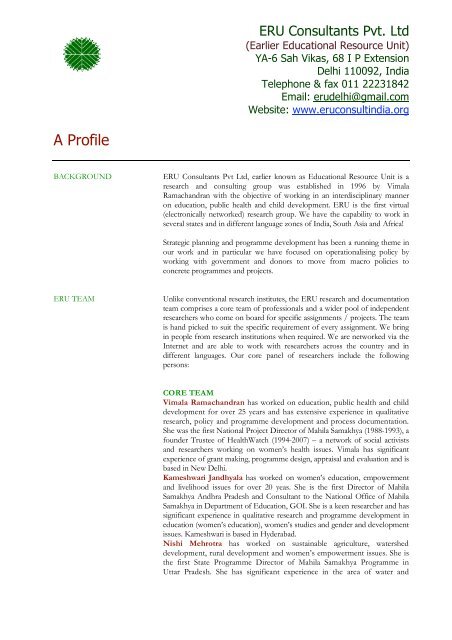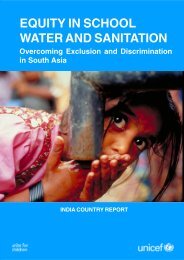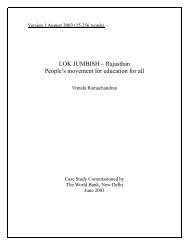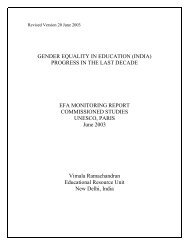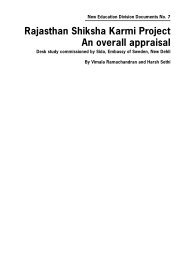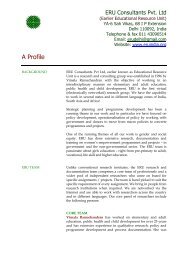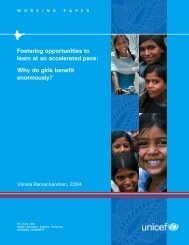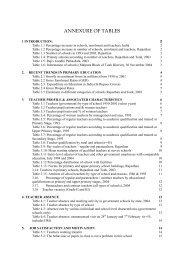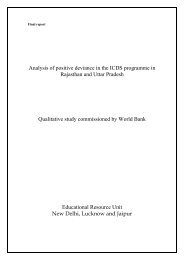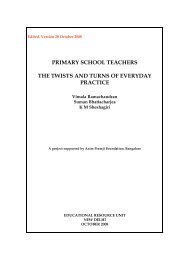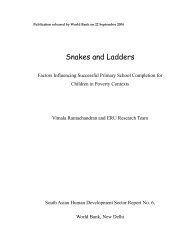A Profile - ERU Consultants Pvt. Ltd.
A Profile - ERU Consultants Pvt. Ltd.
A Profile - ERU Consultants Pvt. Ltd.
You also want an ePaper? Increase the reach of your titles
YUMPU automatically turns print PDFs into web optimized ePapers that Google loves.
<strong>ERU</strong> <strong>Consultants</strong> <strong>Pvt</strong>. <strong>Ltd</strong><br />
(Earlier Educational Resource Unit)<br />
YA-6 Sah Vikas, 68 I P Extension<br />
Delhi 110092, India<br />
Telephone & fax 011 22231842<br />
Email: erudelhi@gmail.com<br />
Website: www.eruconsultindia.org<br />
A <strong>Profile</strong><br />
BACKGROUND<br />
<strong>ERU</strong> <strong>Consultants</strong> <strong>Pvt</strong> <strong>Ltd</strong>, earlier known as Educational Resource Unit is a<br />
research and consulting group was established in 1996 by Vimala<br />
Ramachandran with the objective of working in an interdisciplinary manner<br />
on education, public health and child development. <strong>ERU</strong> is the first virtual<br />
(electronically networked) research group. We have the capability to work in<br />
several states and in different language zones of India, South Asia and Africa!<br />
Strategic planning and programme development has been a running theme in<br />
our work and in particular we have focused on operationalising policy by<br />
working with government and donors to move from macro policies to<br />
concrete programmes and projects.<br />
<strong>ERU</strong> TEAM<br />
Unlike conventional research institutes, the <strong>ERU</strong> research and documentation<br />
team comprises a core team of professionals and a wider pool of independent<br />
researchers who come on board for specific assignments / projects. The team<br />
is hand picked to suit the specific requirement of every assignment. We bring<br />
in people from research institutions when required. We are networked via the<br />
Internet and are able to work with researchers across the country and in<br />
different languages. Our core panel of researchers include the following<br />
persons:<br />
CORE TEAM<br />
Vimala Ramachandran has worked on education, public health and child<br />
development for over 25 years and has extensive experience in qualitative<br />
research, policy and programme development and process documentation.<br />
She was the first National Project Director of Mahila Samakhya (1988-1993), a<br />
founder Trustee of HealthWatch (1994-2007) – a network of social activists<br />
and researchers working on women’s health issues. Vimala has significant<br />
experience of grant making, programme design, appraisal and evaluation and is<br />
based in New Delhi.<br />
Kameshwari Jandhyala has worked on women’s education, empowerment<br />
and livelihood issues for over 20 yeas. She is the first Director of Mahila<br />
Samakhya Andhra Pradesh and Consultant to the National Office of Mahila<br />
Samakhya in Department of Education, GOI. She is a keen researcher and has<br />
significant experience in qualitative research and programme development in<br />
education (women’s education), women’s studies and gender and development<br />
issues. Kameshwari is based in Hyderabad.<br />
Nishi Mehrotra has worked on sustainable agriculture, watershed<br />
development, rural development and women’s empowerment issues. She is<br />
the first State Programme Director of Mahila Samakhya Programme in<br />
Uttar Pradesh. She has significant experience in the area of water and
Educational Resource Unit – A profile Page 2<br />
____________________________________________________________________________________<br />
sanitation and is a highly skilled qualitative researcher and has extensive<br />
fieldwork experience. She is based in Lucknow and has significant ground<br />
level experience in Uttar Pradesh, Uttarakhand, Bihar and Jharkhand. Nishi<br />
is based in Lucknow.<br />
Bharat Patni, an engineer from IIT Roorkee with an MBA from IIM<br />
Ahmedabad, has 32 years of domestic and international experience in the<br />
corporate sector. He then transited into the development sector and spent<br />
six years with Pratham, Mumbai providing full time support on issues<br />
related to general management, donor coordination, MIS, finance and<br />
programme planning / development. He has travelled extensively in the<br />
country in connection with Pratham interface with the government in<br />
Primary Education. He joined <strong>ERU</strong> group in 2006 and has anchored /<br />
managed multi-state research projects. He brings quantitative research skills<br />
to the <strong>ERU</strong> management team. Bharat is based in New Delhi<br />
Vani Periodi, independent researchers, trainer and experienced qualitative<br />
researcher based in Mangalore, Karnataka. She was the District Coordinator<br />
of Mahila Samakhya in Mysore District and a MacArthur Fellow 2003-2005.<br />
She is part of a network of trainers based in Karnataka. She leads <strong>ERU</strong><br />
qualitative research studies in Karnataka. Vani is based in Mangalore.<br />
Niti Saxena, has been a part of <strong>ERU</strong> team since inception and she has<br />
significant experience in quantitative as well as qualitative research. She has<br />
worked on child rights, women’s rights and education and development<br />
issues. Niti is the former Executive Director of AALI (a feminist legal<br />
advocacy and research group headquartered in Lucknow). She leads /<br />
anchors <strong>ERU</strong>’s field projects across northern India. Niti is based in<br />
Lucknow.<br />
Harsh Sethi, Consulting Editor of Seminar Magazine with over thirty years<br />
of engagement with civil society issues, non-party political formations and<br />
non-governmental organisations. He has special expertise in analysis and<br />
interpretation of qualitative and quantitative data. He oversees <strong>ERU</strong><br />
projects with a view to ensure quality of outcome. He is based in New<br />
Delhi.<br />
TRAINING, RESEARCH AND DOCUMENTATION:<br />
2009 (ongoing) DoEE&L, GOI and DFID, India: Training and capacity building of<br />
Mahila Samakhya programme personnel across India.<br />
2009 (ongoing) Effective Intervention & London School of Economics (UK):<br />
Qualitative and quantitative study of situation of elementary education in<br />
Guinea Bissau.<br />
2009 (ongoing) UNICEF (ROSA), Kathmandu: Water, sanitation and education:<br />
exploring inclusion and exclusion – a qualitative study in two districts of<br />
Uttar Pradesh.<br />
2008-09 Sir Dorabji Tata Trust, Mumbai and Zubaan, New Delhi: Part II of<br />
Cartographies of Empowerment – Tracing the Journey of Mahila Samakhya<br />
1988 to 2008. A study conducted in partnership with Mahila Samakhya<br />
units in 9 States of India and ten research partners.<br />
2008 Plan International, India, Baseline survey of elementary schools in Bihar &<br />
Uttar Pradesh
Educational Resource Unit – A profile Page 3<br />
____________________________________________________________________________________<br />
2008 Save the Children (UK), Scoping study on nutritional status of children and<br />
opportunities for improving the nutritional levels of children in India.<br />
2007-08 Plan International, India, Baseline survey of primary schools in Rajasthan,<br />
Andhra Pradesh and Uttarakhand,<br />
2007-08 Azim Premji Foundation, Teacher development in India – mapping the<br />
terrain. (contemporary history of teacher development in India)<br />
2007 UNICEF ROSA, Kathmandu, Girls health and education in South Asia – a<br />
research based study on the situation in 8 countries (Afghanistan, Pakistan,<br />
India, Bhutan, Nepal, Bangladesh, Maldives and Sri Lanka).<br />
2007 Oxfam, India: Basic Education in India – the situation on the ground and<br />
exploring possibilities for intervention.<br />
2006-07 NUEPA, UNESCO and Department of Education, MHRD, GOI,<br />
Mid-term Assessment of MDG goals and EFA – three chapters (a)<br />
Progress made in Uttar Pradesh by Nishi Mehrotra, (b) Progress made in<br />
Andhra Pradesh by Kameshwari Jandhyala and (c) Thematic review of<br />
Education and Equity by Vimala Ramachandran.<br />
2006-07 Plan International India, New Delhi, Research study on the Hidden<br />
Cost of Education in 4 states – Andhra Pradesh, Maharashtra, Orissa and<br />
Rajasthan.<br />
2005-2007 International Labour Organisation, New Delhi and Government of<br />
India, Department of School Education and Literacy, New Delhi:<br />
Improving the quality of education in government schools – caste studies<br />
of programmes with potential for replication covering Andhra Pradesh,<br />
Tamil Nadu, Nagaland, Maharashtra, Rajasthan, Assam, Uttaranchal, Uttar<br />
Pradesh etc.<br />
2005-2006 Royal Netherlands Embassy, New Delhi: Cartographies of<br />
Empowerment – Tracing the Journey of Mahila Samakhya 1988 to 2005. A<br />
study conducted in partnership with Mahila Samakhya units in 9 States of<br />
India and ten research partners.<br />
2004-05 Oxfam N(O)VIB: Systemic issues and strategies to promote equity and<br />
quality in elementary education – a qualitative research study in Andhra<br />
Pradesh and Rajasthan.<br />
2004-05 Knowledge and Skills for Development and IDS Sussex: the India<br />
study in Rajasthan, part of a multi-country study on Teacher Motivation<br />
(Elementary Education) .<br />
2004 World Bank, Study on Positive deviance in ICDS – exploring the factors<br />
that contribute towards better performance of the programme in select<br />
development blocks of Rajasthan and Uttar Pradesh.<br />
2003 DFID, India: An evaluation of Balika Shikshan Shivir (residential<br />
educational programme for out of school girls), Lok Jumbish Project,<br />
Rajasthan.
Educational Resource Unit – A profile Page 4<br />
____________________________________________________________________________________<br />
2002-03 World Bank, Qualitative research study: Factors that facilitate / impede<br />
successful primary school completion - children in diverse poverty<br />
situations in Uttar Pradesh, Karnataka and Andhra Pradesh.<br />
2000-01 DFID, on approval of DPEP Bureau, GOI, Backward and forward<br />
linkages – ten case studies in primary education.<br />
2000 NIEPA and European Commission, Community Participation in<br />
Primary Education with special focus on innovations in Rajasthan.<br />
1999-2000 Department of Education, GOI and NIEPA (as a part of the EFA<br />
2000), Assessment Education and the status of women, exploring linkages<br />
and identifying constraints.<br />
1998 Engendering Development: Lessons from Social Sector Programmes<br />
(with special focus on primary education) in India – independent <strong>ERU</strong><br />
research, with concrete examples from the two fields, that has fed into<br />
gender sensitisation training of a wide range of development agencies and<br />
organisations. Adapted for the education and health sector.<br />
1996 - 1997 ASPBAE, New Delhi, and UNESCO PROAP, Bangkok; Four-Country<br />
study on the status of women's and girl's education in South Asia (India,<br />
Bangladesh, Pakistan and Nepal). Asia South Pacific Bureau for Adult<br />
Education. This project involved identifying teams from researchers from<br />
Pakistan, Bangladesh and Nepal and working with them over a period of<br />
eighteen months.<br />
1996 UNDP, New Delhi, Redefining Safety Net: Inter-linkages between<br />
education, credit, women’s collective and empowerment as the safety net.<br />
1996 UNICEF and Government of Andhra Pradesh, Critical Consciousness,<br />
credit and productive assets - key to sustainable livelihood.<br />
1996 Integrating a gender concerns in mainstream programmes and institutions,<br />
UNICEF and Department of Women and Child Development, GOI. This<br />
research paper was followed by training of specific state office and area<br />
specific teams in UNICEF.<br />
REVIEW AND EVALUATION<br />
2009-11 (ongoing) The Children’s Education Fund Foundation, UK: Qualitative<br />
concurrent review of the Aid India programme in Tamil Nadu, India<br />
2008 Room to Read, New Delhi. Impact assessment of Room to Grow<br />
scholarships for adolescent girls in Delhi and Uttarakhand.<br />
2006 & 2007 Department of Elementary Education, MHRD, Government of India:<br />
National evaluation (in 2 parts covering 24 states in India) of Kasturba<br />
Gandhi Balika Vidhyalaya and National Programme for Girls Education in<br />
the Elementary Sector. Vimala Ramachandran was the Team Leader and<br />
Kameshwari Jandhyala and Nishi Mehrotra were members of the evaluation<br />
team
Educational Resource Unit – A profile Page 5<br />
____________________________________________________________________________________<br />
2007 Oxfam Novib, The Netherlands – Core Programme Evaluation for India<br />
– focus on education and health.<br />
2007 American India Foundation, Review of the Digital Equaliser Programme<br />
in Rajasthan, Orissa, Punjab and Andhra Pradesh.<br />
2006-08 Word Bank, New Delhi, Concurrent review and documentation of a<br />
multi-sectoral child development programme in Madhya Pradesh.<br />
2006-07 Save the Children, UK: Capacity building of NGO partners in Tamil<br />
Nadu.<br />
2006 Sir Dorabji Tara Trust, Mumbai: Facilitating consultations to explore the<br />
creation of a national level institute for education in India.<br />
2006 Sardar Patel Vidhyalaya, New Delhi: Education Audit<br />
2005 Save the Children, UK: Feasibility study – exploring institutional<br />
mechanisms for integrated child development and education in the tsunami<br />
affected areas of India.<br />
2004 Oxfam Lucknow: Analysis of the education policy of Uttar Pradesh and<br />
budget analysis.<br />
2003 UNICEF - Community participation in UNICEF supported programmes<br />
in Uttar Pradesh, Orissa and Maharashtra.<br />
2003 SIDA, New Delhi - Appraisal of Tamil Nadu Primary School<br />
Improvement Campaign, for<br />
2002 European Commission and GoI - Gender and social equity in DPEP –<br />
an overall impact assessment.<br />
2001 Forut, Save the Children Fund of Norway and Sweden - The<br />
Concerned for Working Children.<br />
2000 Group of donors including Dorabji Tata Trust, Mumbai - Kutch Mahila<br />
Vikas Sangathan, Bhuj:<br />
1999-2000 SIDA, New Delhi - Shiksha Karmi Project of Rajasthan<br />
1999 HIVOS, Bangalore - Navsarjan Trust, Ahmedabad:<br />
1996 Ford Foundation, New Delhi - Multiple Action Research Group, New<br />
Delhi:<br />
1996 and 2000 HIVOS, Bangalore - Agragamee, Kashipur, Orissa.<br />
POLICY / PROGRAMME REVIEW AND DEVELOPMENT:<br />
2007 Oxfam N(o)vib, Reformulating and training Urmul Trust, Bikaner to<br />
enable them to develop their proposal from rights based perspective.<br />
2005-07 World Bank, New Delhi, Documentation and concurrent review of a<br />
pilot project in Madhya Pradesh for integrated child development.
Educational Resource Unit – A profile Page 6<br />
____________________________________________________________________________________<br />
2006 Department of Education, MHRD, GoI - Chairing and drafting of the<br />
report of the Sub-group on girls’ education for the formulation of the XI<br />
Plan.<br />
2004 Department of Education, MHRD, GoI - <strong>ERU</strong> led the teams in Gujarat<br />
and Bihar doing the national evaluation of Mahila Samakhya Programme.<br />
2004 Sesame Street, India: Background paper on status of elementary<br />
education in India.<br />
2004 Ace Global Private Limited and Delegation of the European<br />
Commission, New Delhi: Technical assistance for the identification phase<br />
of EC state partnership programme with Chhattisgarh.<br />
2004 Department of Education, GoI and UNICEF: Facilitating regional and<br />
state level planning workshops on National Programme for Girls Education<br />
at the Elementary Level (NPEGEL) for state and district level<br />
administrators.<br />
2004 Swedish International Development Cooperation Agency (SIDA),<br />
Vientiane, Lao PDR: Gender Audit Study of Demand Driven Approach<br />
to basic Education for All in Lao PDR.<br />
2003 UNESCO, Paris: Global Monitoring Report 2003:<br />
(a) Gender equality in education (India) – progress in the last decade<br />
(b) Empowering Education: the Mahila Samakhya experience<br />
2003 The World Bank:<br />
(a) Case study of Lok Jumbish (Education for All) Project of Rajasthan as<br />
an input into the MDG report;<br />
(b) Case study of Learning Guarantee Scheme of Government of<br />
Karnataka and Azim Premji Foundation as ain input into the MDG<br />
report;<br />
(c) Case study of Madhya Pradesh Education Guarantee Scheme – a Social<br />
Inclusion and Empowerment Case Studies for: Shanghai Conference<br />
on Scaling up Poverty Reduction being planned by the World Bank.<br />
2003-2005 Naandi Foundation, Hyderabad and Government of Andhra Pradesh<br />
Strategic planning and hands on support to the elementary<br />
education quality improvement project in Paderu area of<br />
Vishakhapatnam District<br />
Strategic planning and resource support to the Hyderabad City<br />
elementary education quality improvement project<br />
2002 European Commission (New Delhi): Planning support and preparation<br />
of approach paper to appraisal and pre-appraisal of European Commission<br />
support to Government of India’s Sarva Shiksha Abhiyan<br />
2002 Swedish International Development Cooperation Agency (SIDA),<br />
New Delhi: Country Strategy Paper on Social Sector Reform.<br />
2001 UNICEF, India Country Office, New Delhi: Strategic planning<br />
exercises in primary education – as member of Think Tank.
Educational Resource Unit – A profile Page 7<br />
____________________________________________________________________________________<br />
2001 UNFPA, New Delhi: Facilitate 6 th Country Programme Cycle strategic<br />
planning exercise.<br />
2001 Care, India: Basic Education in India advocacy strategy paper<br />
commissioned. This document is an input into their strategy planning<br />
exercise in India.<br />
2000 Ford Foundation:<br />
(a) Santiago: Incorporating Women’s Health Concerns in Health Sector<br />
Reforms: Key Areas for Strategic Advocacy and Citizen Participation.<br />
(b) Educational programmes for adolescents – with focus on out-of-school<br />
children, New Delhi<br />
2000 Nuffic, The Netherlands: Specialised inputs on gender and social equity<br />
issues in the European Commission primary and upper primary education<br />
project formulation mission<br />
1999 Consultant to SPARC (a Mumbai-based NGO) in a World Banksponsored<br />
initiative to review the experience of NGO involvement to<br />
promote women’s participation and community involvement in World<br />
Bank-supported social sector development projects in India.<br />
1999 N(O)VIB, The Netherlands: Education Project (NGO) Identification in<br />
India.<br />
1998 – 1999 DFID, India: Development of an education strategy for reaching out to<br />
children and young people in the 11 – 17 age group.<br />
1998 UNICEF, India Country Office, Government of Rajasthan and<br />
UNICEF Jaipur: Formulation of Government of Rajasthan policy for<br />
women<br />
1997 Swedish International Development Cooperation Agency (SIDA),<br />
New Delhi: Rights, social justice and governance, exploring opportunities<br />
for NGO support in Rajasthan.<br />
1997 UNESCO:<br />
(a) Planning and executing an international training programme for<br />
educational administrators to integrate gender issues into monitoring<br />
and evaluation system of non-formal education programmes.<br />
UNESCO PROAP, Bangkok<br />
(b) Co-ordinating regional consultative meetings (South and South<br />
east Asia) on Education for Survival jointly with Nirantar, New<br />
Delhi, as a run-up to CONFENTEA V, IIE, Hamburg.<br />
1997-98 Swedish International Development Cooperation Agency (SIDA),<br />
New Delhi: Team leader - project formulation for a SIDA-assisted<br />
Reproductive and Child Health Project in seven districts of Rajasthan, India.
Educational Resource Unit – A profile Page 8<br />
____________________________________________________________________________________<br />
PUBLICATIONS ARISING OUT OF RESEARCH:<br />
BOOKS:<br />
1. (2008) Vimala Ramachandran: Health and girls education in South Asia: An essential synergy; UNICEF –<br />
UNGEI, Kathmandu<br />
2. (2008), Rashmi Sharma and Vimala Ramachandran: The Elementary Education System in India: A field<br />
based investigation into institutional structures, processes and dynamics, Routlege India.<br />
3. (2006) Leela Visaria and Vimala Ramachandran (Ed): Reality Check: Abortion in India, Routledge India,<br />
New Delhi.<br />
4. (2004) Vimala Ramachandran: Fostering opportunities to lean at an accelerated pace: Why do girls benefit<br />
enormously UNICEF Working Paper, New Delhi<br />
5. (2004) Vimala Ramachandran (Ed): Hierarchies of Access: Gender and Equity in Primary Education;<br />
Sage Publications, New Delhi.<br />
6. (2004) Snakes and Ladders: Factors Influencing Successful Primary School Completion for Children in<br />
Poverty Contexts; South Asian Human Development Sector Report No. 6, World Bank, New Delhi<br />
7. (2003) Vimala Ramachandran (Ed): Getting children back to school: case studies in primary education;<br />
Sage Publications, New Delhi.<br />
8. (2001) Vimala Ramachandran and Harsh Sethi: Shiksha Karmi Project of Rajasthan – an overall appraisal;<br />
New Education Division Document No 7, Swedish International Development Cooperation Agency<br />
9. (1998) Vimala Ramachandran: Girls and Women’s Education: Policies and Implementation Mechanisms<br />
– Case Study India; UNESCO-PROAP, Bangkok.<br />
10. (1998) Vimala Ramachandran (Ed) Bridging the gap between intention and action - Girls and Women’s<br />
Education in South Asia, Editor the book and author of the Indian experience, UNESCO-PROAP,<br />
Bangkok and ASPBAE, New Delhi, May.<br />
ARTICLES IN JOURNALS<br />
11. (2007) Vimala Ramachandran and Kameshwari Jandhyala: Strengthening the government school system –<br />
lessons from India, Economic and Political Weekly, VOL 42 No. 48 December 01 - December 07, 2007<br />
12. (2007): Vimala Ramachandran, Nishi Mehrotra and Kameshwari Jandhyala: Do incentives make a<br />
difference to meaningful education of socially underprivileged children Journal of Educational Planning<br />
and Administration, NUEPA, New Delhi<br />
13. (2006) Vimala Ramachandran, Education and livelihood, Seminar 563, June. New Delhi<br />
14. (2005) Vimala Ramachandran: Why school teachers are de-motivated and disheartened, Economic and<br />
Political Weekly, VOL 40 No. 21 May 21 - May 27, 2005<br />
15. (2003) Vimala Ramachandran, Kameshwari Jandhyala and Aarti Saihjee: Through the life cycle of<br />
children: factors determining successful primary school completion; Economic and Political Weekly,<br />
VOL 38 No. 47 November 22 - November 28, 2003<br />
16. (2003) Vimala Ramachandran: Backward and forward linkages that strengthen primary education in<br />
Economic and Political Weekly, March 8-14, Volume XXXVIII, No 10<br />
17. (2002) Vimala Ramachandran and Aarti Saihjee: The New Segregation – reflections on gender and equity<br />
in primary education, Economic and Political Weekly; No 17 Vol. XXXVII, 27 April-2 May.<br />
18. (2001) Vimala Ramachandran: Community Participation in Primary Education – Innovations in<br />
Rajasthan; Economic and Political Weekly; Vol. XXXVI, June 23<br />
19. (1999) Vimala Ramachandran: Adult Education: A tale of empowerment denied; Economic and Political<br />
Weekly; Vol. XXXXIV, No 15 April 10.<br />
20. (1998) Vimala Ramachandran: Engendering Development: Lessons from Social Sector Programmes in<br />
India: Indian Journal of Gender Studies, Vol. 5: 1<br />
21. (1997) Leela Visaria and Vimala Ramachandran: Emerging issues in reproductive health, Economic and<br />
Political Weekly, Vol. 22, No 36, September 6<br />
22. (1997) Vimala Ramachandran: Changing face of the development sector in India; VOICES, Volume 1,<br />
Number 2<br />
23. (1996) Vimala Ramachandran: NGOs in the times of globalisation: from family planning to reproductive<br />
health; Seminar, November.<br />
24. (1996) Vimala Ramachandran: Fertility and women’s autonomy in the Indian Family; India International<br />
Centre Journal Special Issue on Women And The Family, Winter
Educational Resource Unit – A profile Page 9<br />
____________________________________________________________________________________<br />
25. (1995) Vimala Ramachandran: Equality among unequal partners - relationship between NGOs and the<br />
government in India, The Administrator, Lal Bahadur Shastri National Academy of Administration,<br />
Mussoorie, July.<br />
CHAPTERS IN PUBLISHED BOOKS:<br />
26. (2008) Vimala Ramachandran, Kameshwari Jandhyala and Aarti Saihjee: Through the Life Cycle of<br />
Children: Factors that facilitate / impede successful primary school completion, in Rama Baru (Ed)<br />
School Health Services in India, Sage Publications, New Delhi<br />
27. (2008 forthcoming) Vimala Ramachandran: Democracy and Education, in Elaine Unterhalter (ed)<br />
Handbook of International Comparative Education, Institute of Education, London, UK (forthcoming)<br />
28. (2008 forthcoming) Vimala Ramachandran, Quality: the heart of equity, in Joel Cohen and Martin Malin<br />
(Ed) International Perspectives on the Goals of Universal Basic and Secondary Education, American<br />
Academy of Arts and Sciences, Cambridge MS, published by Routlege, USA<br />
29. (2006) Vimala Ramachandran: A school in every village – the Education Guarantee Scheme in Madhya<br />
Pradesh, India, in Deepa Nayayan (Ed) World Bank compilation of case studies prepared for the<br />
Shanghai Conference, World Bank, Washington DC.<br />
30. (2006) Vimala Ramachandran and Aarti Saihjee, The New Segregation in Primary Education –<br />
Implications for Local Governance, in Amit Prakash (Ed), Local Governance in India, Oxford University<br />
Press, New Delhi<br />
31. (2005) Kameshwari Jandhyala: Working within and without, in Mandira Kumar and Padma M<br />
Sarangapani (Ed), Improving Government Schools – What has been tried and what works, Sutradhar and<br />
Books for Change, Bangalore<br />
32. (2002) Vimala Ramachandran: Literacy, Development and Empowerment: Conceptual Issues, for edited<br />
book on Gender Gap in Basic Education Edited by Dr. Rekha Wazir; Sage Publication, N Delhi<br />
33. (2002) Vimala Ramachandran: Education and the status of women; in India Education Report Edited by<br />
Dr Govinda, Oxford University Press, New Delhi.<br />
34. (1998) Vimala Ramachandran: Voluntary organisation, professional agency or sub-contractor - the<br />
changing profile of the non-government sector in India, Dr. Pravin Visaria, M L Dantwala and Harsh<br />
Sethi (Eds.) Social Change through voluntary action, Sage Publications New Delhi, September<br />
35. (1996) Vimala Ramachandran: Redefining Safety Net: in N Rao, L Rurap and R Sudarshan (Eds.): Sites of<br />
Change: The Structural Context for Empowering Women in India, UNDP / FES


